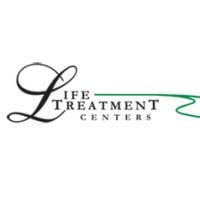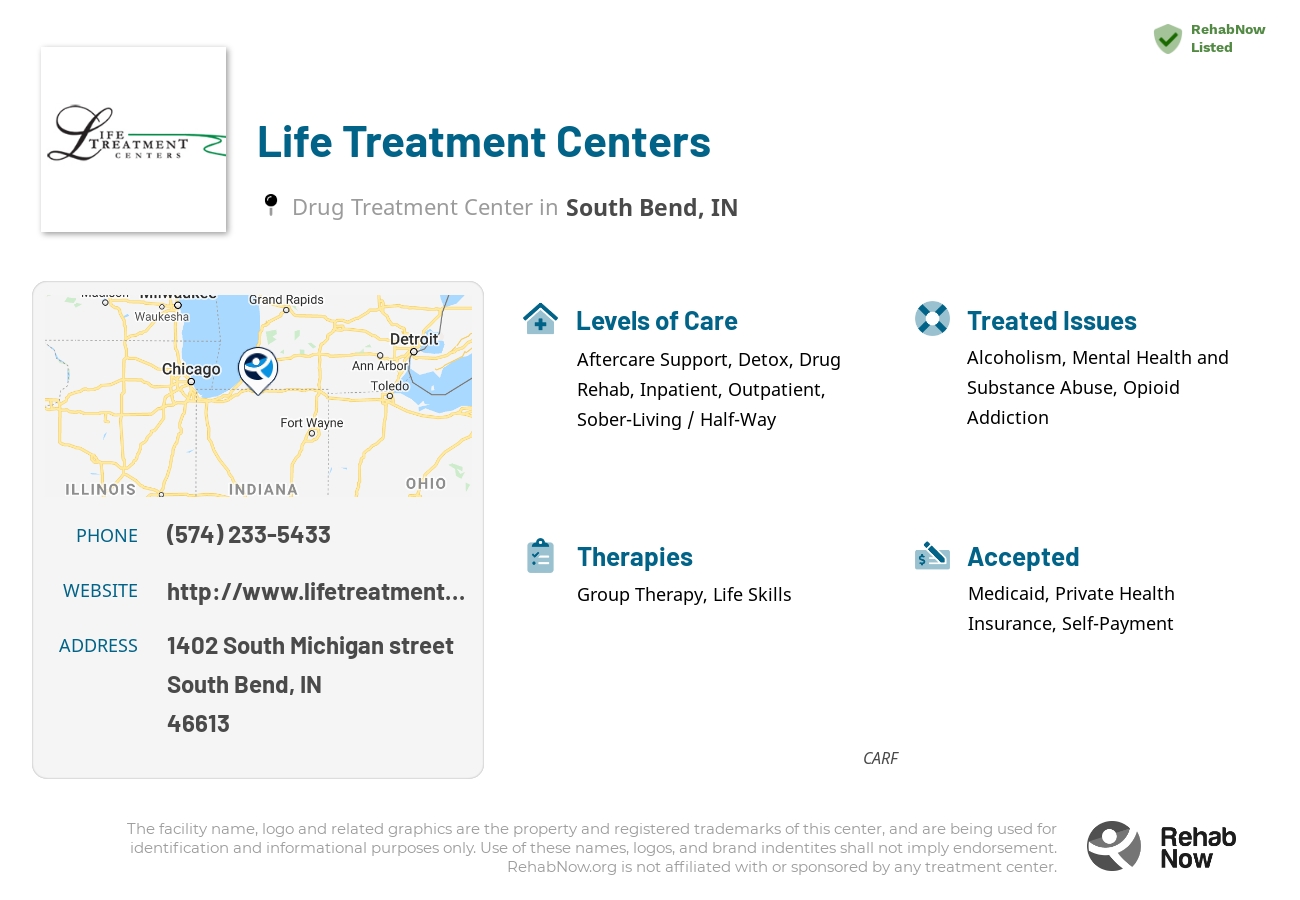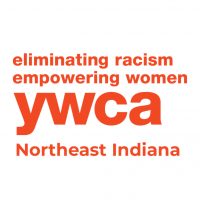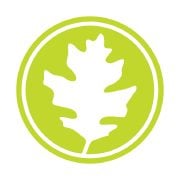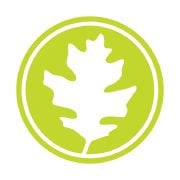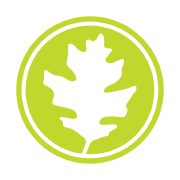Life Treatment Centers
Drug Rehab Center in South Bend, Indiana
Life Treatment Centers, an accredited addiction treatment facility in South Bend, IN founded in 1972 and offering comprehensive care for individuals seeking to get sober, including detoxification, rehabilitation, aftercare support and various levels of residential care such as inpatient, outpatient and sober-living or half-way housing programs which accepts private health insurance for more accessible care.
About Life Treatment Centers in Indiana
Life Treatment Centers is a prestigious addiction treatment facility located in South Bend, IN. With a rich history dating back to its founding in 1972, Life Treatment Centers has been providing high-quality care and support to individuals suffering from alcoholism, opioid addiction, substance abuse, dual diagnosis, and drug addiction. As a testament to its commitment to excellence, Life Treatment Centers is accredited by the Commission on Accreditation of Rehabilitation Facilities (CARF), ensuring that it meets rigorous standards for quality and effectiveness in addiction treatment. Offering a comprehensive range of services, Life Treatment Centers caters to individuals at different levels of care, including aftercare support, detox, drug rehab, inpatient, outpatient, and sober-living/half-way residential programs.
Life Treatment Centers in South Bend, IN offers a wide array of services to address the complex and diverse needs of individuals struggling with addiction and substance abuse. Through its aftercare support, individuals have access to ongoing assistance and resources to maintain their sobriety beyond the treatment program. The facility also provides detoxification services, which are essential for safely and comfortably managing the withdrawal symptoms associated with drug and alcohol addiction. With its inpatient and outpatient programs, Life Treatment Centers offers both intensive and flexible treatment options tailored to the specific needs of each individual. Additionally, the facility provides residential care in a sober-living/half-way environment, helping individuals transition back to everyday life while still receiving necessary support and guidance. These comprehensive services make Life Treatment Centers a trusted and reliable resource for those seeking effective and compassionate addiction treatment.
Genders
Ages
Modality
Additional
Accreditations

CARF
The Commission on Accreditation of Rehabilitation Facilities (CARF) is a non-profit organization that specifically accredits rehab organizations. Founded in 1966, CARF's, mission is to help service providers like rehab facilities maintain high standards of care.
Conditions and Issues Treated
Substance abuse creates problems that affect people in South Bend, IN on many levels. First, substance abuse affects the individual who is abusing drugs or alcohol. This can result in health problems, including heart damage and overdose. Substance abuse also affects the user’s family, friends, co-workers, classmates, or peers. These people feel frustrated because they do not know how to help their loved ones struggling with addiction. At the same time, the addict cannot control his behavior. Lastly, friends and family members of addicts are affected financially by substance abuse.
The good news is that effective treatments can help prevent substance abuse or treat its effects on the user. These treatments, which include behavioral therapy and counseling sessions, target the underlying causes of substance abuse, helping users achieve sobriety so they can regain control over their lives. They also teach users to cope with stress in ways other than using drugs or alcohol.
Opioid addiction has become a significant health problem in the United States. When a person’s life becomes unmanageable because of an opioid addiction, treatment can help them get sober. Treatment includes medical care and counseling.
“With so many people struggling with opioid addiction, we need more care and attention for those who want to quit. Opioid addicts often take opioids when they experience a painful injury – that’s how the cycle starts! When someone begins taking their medication differently than prescribed or takes an excessive amount of drugs, it means they’re hooked on drugs and in danger of overdosing.
The most successful way to beat this is through detoxing from these types treatments at Life Treatment Centers in . Most facilities start by using medical support during the process while providing counseling services; rehabilitation comes later on after treatment has been completed successfully.
Levels of Care Offered
This center offers a variety of custom treatment tailored to individual recovery. Currently available are Aftercare Support, Detox, Drug Rehab, Inpatient, Outpatient, Residential, Sober-Living / Half-Way, with additional therapies available as listed below.
The first level of recovery is detox. It involves giving a person the opportunity to get the toxins out of their body safely. The individual receiving treatment at Life Treatment Centers typically will get ill during detox, and they will often start using again to get rid of unpleasant emotions and complicated physical responses. It is why having a Indiana medical professional present is so critical. A medical professional can make sure that patients do not start using again during detox and stay physically healthy during the process. They will also have treatment on a mental level to relieve their symptoms and guide them through the process.
Going to an inpatient rehab facility means living there while all aspects of addiction or co-occurring disorder get addressed. The treatment involves medical supervision, therapy, and future planning.
This type of rehabilitation provides a drug-free environment for people who struggle with chronic/long-term addiction without having access to drugs outside the center (or their own home). It takes away any distractions because they live there 24 hours per day. If someone is trying to break out old habits, which could lead them back into substance abuse, things like jobs or school can be put on hold until after they complete their stay to focus solely on recovery.
Outpatient programs at Life Treatment Centers, the South Bend resident can live with their family while continuing with their job or studies. Treatment includes educating the patient on drug abuse, medications, and counseling sessions at the individual or group level. Outpatient treatment plans cover diagnosis, detoxification, management, and counseling. They are a popular option for those who have graduated from inpatient facilities.
Sober living homes (abbreviated SLHs or sometimes sober houses ) are temporary housing for recovering addicts, most often those in early or mid stage recovery, who typically live in the home for 3 to 6 months.
The typical SLH functions as a halfway house, providing a stable living environment for addicts in recovery.
While at an SLH, residents typically meet with various therapists on site and attend regular 12-step meetings as well as other recovery group meetings.
Residential treatment programs are those that offer housing and meals in addition to substance abuse treatment. Rehab facilities that offer residential treatment allow patients to focus solely on recovery, in an environment totally separate from their lives. Some rehab centers specialize in short-term residential treatment (a few days to a week or two), while others solely provide treatment on a long-term basis (several weeks to months). Some offer both, and tailor treatment to the patient’s individual requirements.
Without aftercare support, addicts can easily relapse back into addiction. It is crucial to integrate the addict back into society. Aftercare support should take place after outpatient treatment has ended.
There are a few different types of aftercare support that patients can seek after completing an inpatient treatment program:
- 12 Step Self-help groups (AA, NA)
- Therapeutic communities,
- Long-term, structured sober living arrangements
- Halfway houses (residential treatment centers)
Many different support groups exist for addicts to seek help after treatment. Some are more effective than others, depending on the person’s addiction, background, and other factors.
Therapies & Programs
Group therapy sessions are another common addiction recovery service. These group sessions typically involve six to 12 addicts who meet regularly with a trained professional for support and guidance.
During these sessions, the group shares their experiences with one another and provides feedback that can help each member avoid relapse or overcome specific obstacles they are facing in their recovery process. With this type of support and guidance, addicts can feel like they are part of a community that understands their struggles and will help them get through the hard times.
Cognitive Behavioral Therapy (CBT) focuses on the underlying thoughts and behaviors that caused the problem of addiction in the first place and may cause a relapse. Negative feelings are common in drug abuse disorders, but they can lead to co-occurring disorders if not recognized. CBT involves strategies that help to change the behavior pattern by restructuring negative thoughts into positive ones. It helps to remove these feelings, and it provides long-term benefits. Also, CBT promotes self-awareness and self-control. It can be administered as a monotherapy or as part of combination therapy.
CBT can improve the patient’s mood, reduce drug cravings and boost success rates on treatment plans. Regular practice can help individuals handle negative attitudes, thoughts, and feelings without turning to drugs or alcohol. The core belief of Cognitive Behavioral Therapy (CBT) is that one’s moods, behaviors, and actions are all connected. Individuals can improve their quality of life using CBT. It helps addicts understand the patterns of thought and feelings that cause them to use drugs or alcohol and develop a healthy response.
It’s not as simple as quitting drinking or using drugs and expecting the hard part to be over. Many addicts in recovery have discovered that they need to improve skills such as time management, organization, communication, socialization, and self-esteem. Learning certain life skills can help those who are struggling with addiction.
Payment Options Accepted
For specific insurance or payment methods please contact us.
Is your insurance accepted?
Ask an expert, call (888) 674-0062
Additional Details
Specifics, location, and helpful extra information.
South Bend, Indiana 46613 Phone Number(574) 233-5433 Meta DetailsUpdated November 25, 2023
Staff Verified
Life Treatment Centers Patient Reviews
There are no reviews yet. Be the first one to write one.
South Bend, Indiana Addiction Information
The state of Indiana ranks 14th in the nation for drug abuse, but 17th for drug overdoses. The state has many high-quality rehabilitation centers, but reports show that there are about 20 deaths per 100,000 people. This is due to its location making it a drug trafficking haven, where many drugs are further distributed into the country.
9% of the population in South Bend, Indiana struggles with drug addiction or abuse. The number of drug overdose deaths increased by 643% between 1999 and 2016. 1 in 10 adults has reported using illicit drugs. Heroin was involved in 594 deaths, and fentanyl was involved in 484. Most drug treatment facilities in South Bend, Indiana, offer individual and group therapy, medication-assisted treatment, and detoxification.
Treatment in Nearby Cities
- Rockport, IN (264.7 mi.)
- Kendallville, IN (53.2 mi.)
- Evansville, IN (264.6 mi.)
- Decatur, IN (89.5 mi.)
- Logansport, IN (62.9 mi.)
Centers near Life Treatment Centers
The facility name, logo and brand are the property and registered trademarks of Life Treatment Centers, and are being used for identification and informational purposes only. Use of these names, logos and brands shall not imply endorsement. RehabNow.org is not affiliated with or sponsored by Life Treatment Centers.
